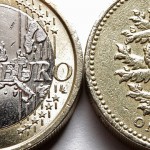The pound traded little changed, close to 1-week high, following BoEs decision to keep its policy unchanged.
Having reached a session high at 1.6480 at 08:00 GMT, GBP/USD traded little changed at 1.6458 at 13:00 GMT, gaining 0.05% on a daily basis. Support was likely to be received at January 8th low, 1.6377, while resistance was to be encountered at January 2nd, 1.6604.
The Monetary Policy Committee of BoE decided today to keep its key interest rate at a record low 0.5% and to leave the amount of 375 billion pounds in monthly bond purchases unchanged, which was largely anticipated by analysts.
According to a report by Goldman Sachs Group Inc., cited by Bloomberg, the fastest growth since 2010 may translate into unemployment declining to the target level of 7%, at which the BoE will review its policy as early as June.
Mark Carney became a governor of BoE in July, and a month later announced his strategy to keep borrowing costs low until the unemployment falls to 7%. BoE may be urged to change the unemployment threshold as the economy improves, diminishing confidence in the program, designed to bolster UK economic recovery.
Earlier today, the UK National Statistics reported the nations trade deficit narrowed to 9.44 billion pounds from a downwardly revised 9.65 billion pounds in October. Analysts had projected that the trade deficit will narrow to 9.45 billion.
The report revealed the UK exports to the EU increased to 12.75 billion in November, reaching the highest level since August.
Meanwhile, yesterday, Fed minutes revealed decreasing economic benefits from the bond-buying program, which accompanied with recent upbeat data, increased bets that Fed policy makers might extend reductions in their monetary stimulus program in the near future.
Investors awaited the US Labor Department to publish a report on the number of non-farm payrolls for December, due to be released tomorrow. According to the median analysts’ forecast, employers probably added 195 000 workers last month, down from 203 000 in November. Yesterday, a report by the ADP research institute revealed the US private sector added 238 000 workers in December, the most since January 2012, defying analysts’ projections of a decrease to 200 000 from 215 000 workers in November. The ADP report is calculated according to the same methods the Bureau of Labor Statistics uses and is published every month, two days before the official BLS employment rate statistics.
The greenback received support on Tuesday, after the US Commerce Department reported that the US trade deficit narrowed to $34.25 billion in November, defying analysts’ projections that the trade deficit will widen to $40.00 billion. In October the US trade deficit was downwardly revised from $40.64 to $39.33 billion.
Data showed that the US imports declined 1.4% to $229.1 billion, while exports rose 0.9% to a record high $194.9 billion.
According to the median estimate of economists surveyed by Bloomberg on December 19th, the Federal Reserve may reduce the purchases in $10 billion increments over the next seven meetings, before ending the program in December 2014.
Elsewhere, having reached a session high at 1.0845 at 05:25 GMT, USD/CAD traded at 1.0843 at 10:25 GMT, gaining 0.20% for the day. Support was likely to be received at January 8th low, 1.0774, while resistance was to be met at May 25th 2010 high, 1.0853.





